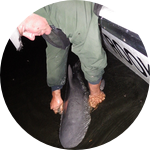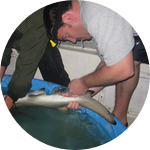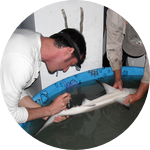About This Project
Sharks are sensitive to capture and handling. The stress response during commercial bycatch, recreational catch-and-release, and research fisheries captures may be exacerbated in certain environmental conditions. We're evaluating bull and bonnethead sharks' stress responses from measurements of their blood, when caught in waters of differing parameters (temperature, salinity, and dissolved oxygen). Findings may support capture and handling recommendations to minimize acute and delayed mortality.
Ask the Scientists
Join The DiscussionWhat is the context of this research?
It is well established that water quality parameters (e.g., temperature, salinity, and dissolved oxygen or DO) affect the metabolism and osmoregulation of bony fishes; however, their effects on the shark stress response are not well studied. Elevated temperature appears to increase the stress response, leading to a more extensive decrease in blood and tissue pH (also known as acidosis) and increased mortality, in both fishes and sharks. Studies have shown varying effects on acid-base, blood gas and metabolic disturbances in fishes. To our knowledge, there are no data on acid-base or blood gas changes in sharks exposed to different salinities or DO that may exacerbate a concurrent response to an acute stressor. For more details on shark stress physiology, check out my post in Lab Notes.
What is the significance of this project?
If bull and bonnethead sharks are found to have increased stress responses in certain water quality conditions that could lead to increased mortality, then findings will offer evidence to support capture and handling recommendations to commercial, recreational, and research fisheries. This can encourage diligence in shark capture and handling in warm waters by decreasing soak times, continually monitoring gear, releasing hooked sharks promptly after capture and detection, and executing veterinary examination, diagnostics, and treatments promptly; all with the goal of minimizing acute and delayed mortality.
What are the goals of the project?
The goal of this study is to assess the effects of environmental variation on the stress response to capture and handling in bonnethead and bull sharks in order to guide the formulation of capture and handling recommendations to minimize acute and delayed mortality of captured sharks in commercial and recreational fisheries, and in fisheries research. The objectives are to conduct analyses to: 1) determine appropriate temperature corrections, 2) determine the nature of data distributions to guide subsequent analytical methods, 3) determine the nature of relationships among water quality variables, 4) model the effects of water quality parameters on the blood gas response of sharks, and 5) publish results in the Journal of Coastal Research.
Budget
Field work and sample collection has been completed; the research team has developed a data set on 61 bull and 93 bonnethead sharks that were captured and handled for fisheries research in the Rookery Bay Research Reserve over a 4 year period. Funding is requested to support Dr. Anderson’s time to conduct statistical analyses and reporting to determine the effects of water quality parameters on the stress response due to capture and handling. Temperature correction analysis, regression model comparisons, and tests for normality of data distributions will help the statistician decide if data transformations are required before conducting further analysis. Principal components analysis will inform the nature of relationships among independent and dependent variables, guiding the selection of the most important variables in the group for further analysis. Multiple polynomial regressions will be used to model the relationships of water quality variables to the stress response of sharks.
Endorsed by
Meet the Team
Michael Hyatt, DVM
I have been the staff veterinarian at Adventure Aquarium in Camden, New Jersey for the past 5 years. Prior to this position, I completed a 2 year internship at the Georgia Aquarium and a 1 year internship at the Florida Aquarium and the University of Florida's Tropical Aquaculture Laboratory. I am a graduate of the University of Florida’s College of Veterinary Medicine (Go Gators!). This research project started back when I was at the Florida Aquarium and was originally just a small pilot project. The information that we were finding was so exciting, that it turned into a 4-year field project broken down into different studies producing two publications. This is the final study of this project and we need your help in completing the statistical analyses.
Paul Anderson, PhD
I have dedicated my academic and professional life to the fields of environmental conservation and marine biology, pursuing programs integrating exhibitry, conservation, research, and education. Over the course of my career, I have developed a robust and diverse skill set in capacity building, exhibit development, data analysis, grant proposal preparation and administration, project management, scientific research, teaching, and writing. I have developed 12 static and live exhibits, published 12 peer-reviewed scientific publications, delivered over 300 presentations in the field to audiences of all ages all over the United States, acquired over $700,000 in grants and scholarships to support environmental conservation, education, exhibitry, and research initiatives, and have been featured in programs aired on ABC, National Geographic, and other media outlets. My mission is to advise, inform, inspire, and take strategic action to conserve our natural world.
Project Backers
- 12Backers
- 11%Funded
- $500Total Donations
- $41.67Average Donation



